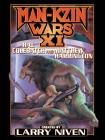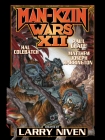Man-Kzin Wars XI by Hal Colbatch (ereader manga txt) 📗

- Author: Hal Colbatch
Book online «Man-Kzin Wars XI by Hal Colbatch (ereader manga txt) 📗». Author Hal Colbatch
The tigripard must be far away. Surely if it was nearby I would know by now. Perhaps it recognized the .22 as a weapon. Perhaps like so many larger wild creatures it avoided even the ruins of Man. I didn't know then that it had another good reason for keeping away from the house.
I wrenched down a splintered door lintel. A piece of it made a better crutch than my empty gun. Leaning heavily on it, I set off up what had been that hamlet's only street. A black silhouette grew around that orange square as I drew nearer: a bigger house standing by itself on a rise of ground. The light was an upper window.
There was a path leading to the door, but as I approached it more closely I realized things: the house was too big, the upper windows too high and small, while the ground-floor windows, where they occurred at all, were mere slits, and dark. The door was too high and wide. And, as I said, the light in that window was orange. There were other things about the architecture. This was not a human house but a kzin one. I looked back and saw how on its rise of ground it dominated the hamlet and gave a view of all the surrounding lands. This had been the mansion of the local kzin overseer of human slaves.
Plainly it had been slighted during the Liberation. I could make out, now that I looked, where the high walls and towers that must have surrounded it in the old kzin architectural style would have stood. Their rubble filled what must once have been a moat or ditch. I saw stumps of concrete and metal where defense and security installations must have been torn down. Behind the house were some large storage tanks, though I could not see whether or not they were intact. On the roof silhouetted against the sky in the lightning there was no sign of the dishes or antennas of modern communications equipment.
But that light burning now was ruddy orange. Not white or yellow. Only kzinti liked that orange light. Were there kzinti here still? It was quite possible. I knew that some of them still lived in the depopulated districts, shunning humans for obvious reasons, and this place, purpose-built and to their size, still relatively defensible, would be far more suitable for them than any others around. As I stood looking up at it I saw the silhouette of someone or something cross the lighted window.
Well, I would ask no shelter or favors from kzinti. Both pride and prudence said that. I was a soldier and I could stand an uncomfortable night in the ruins if necessary.
Trying to distance myself from the pain in my ankle, I hobbled back through the mud to the ghost-hamlet. For no particular reason I knew, save that it seemed the best-roofed and I had left the .22 there, I returned to the first house I had entered and curled up in my former place.
Then the zeitungers came.
I didn't know then that's what it was. I had heard of the zeitungers, originally called the zeitung-schreibers, of course, but I had never encountered them. And what I had heard of them had given me no true idea of them or of what encountering a pack of them when alone at night and physically spent was like.
Humans and kzinti alike on Wunderland loathed them and would stop at nothing to exterminate them. Like the Advokats and the Beam's Beasts, however, they liked the ample food which they associated with human activity. No one had told me they were often to be found in the ruins of human buildings here, presumably because nobody thought I would be spending a night in such ruins. They were carrion-eating vermin like the disgusting Advokats but with, in addition, an ability to project psychic damage and distress which they used as a weapon, an especially potent one when they were packing. They didn't limit themselves to carrion. The zeitungers' mental emanations could make a small-brained animal—an Earth rabbit or dog, say—lie down and scream, waiting for them to mob it and tear it to pieces alive.
On a big-brained animal and especially on a sophont the effect was more complex. Cognitive dissonance, a combination of pathological anxiety, hallucination, hypertension and, above and beneath and overarching all, black, disabling, even killing, clinical depression—if "depression" is an adequate word. Wunderland creatures had evolved a certain resistance to the zeitunger power. Earth animals, and humans, had not. The creatures could apparently do nothing else mentally. They might be able to communicate among themselves—every member of a shoal of fish or flock of birds on Earth can turn in the same direction in an instant—but they were not telepaths. The only power their dim minds had was destruction.
All the meanings of darkness. There are two kinds of memories which, if you let your mind dwell on them too intensely in the wrong circumstances, can destroy your reason and you. We all have a store of them and they are in a sense opposites. Normally we can erect a kind of cordon sanitaire around them most of the time: one kind is of horror, trauma, tragedy present again and unbearable; the other is of joy, happiness, innocence, destroyed, violated and lost forever. They can combine. The zeitungers give you both, with a quantum jump in emotional intensity and immediacy. That happened.
It began like a dream. Word-salads. A brain beginning to race, like a vehicle going out of control. And a high, thin monotonous threnody wailing in my brain to the strings of a harp:
Till a man shall read what is written,
So plain in clouds and clods;
Till a man shall hunger without hope
Even for evil gods . . .
Then very early memories of gardens—lost gardens. Myself a baby with toys in a nursery, laughing on my mother's





Comments (0)